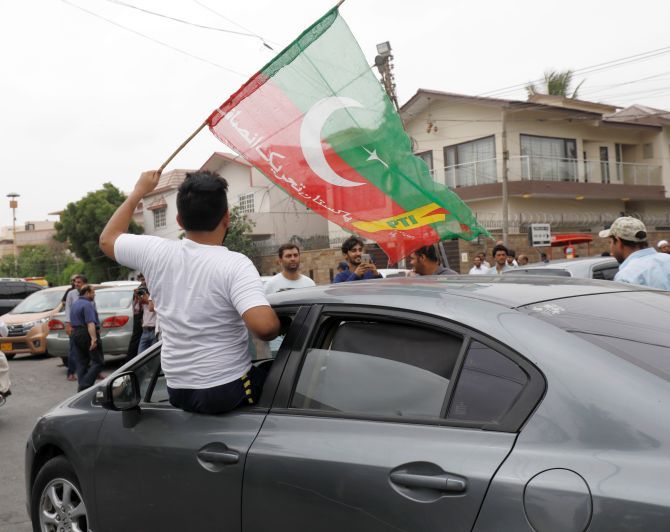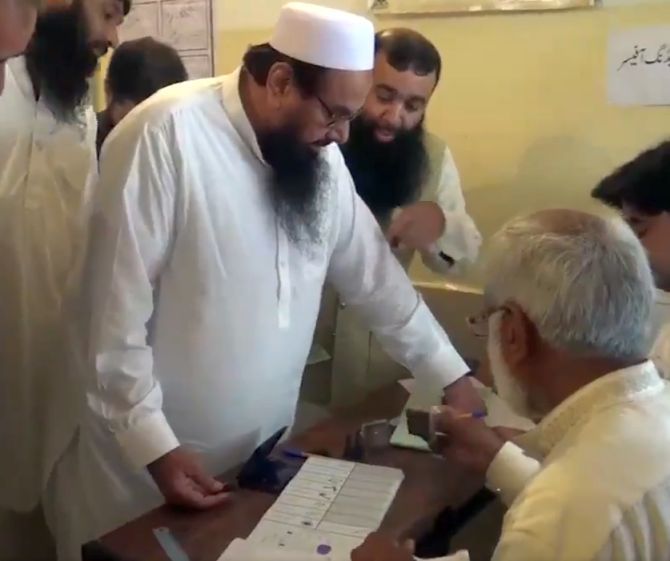This election is the second democratic transition of power in the nation’s 70-year history.

Pakistan’s flamboyant cricketer-turned-politician Imran Khan’s Pakistan Tehreek-e-Insaf was leading in 109 seats while its main rival Pakistan Muslim League-Nawaz was way behind with 67 seats in an election marred by a deadly suicide attack and allegations of manipulations by the powerful military.
The Pakistan Peoples Party of former president Asif Ali Zardari was leading in 38 seats, a sign indicating that he could be a ‘kingmaker’ in case of a hung parliament, according to media reports.

Polling was postponed in two constituencies following the death of candidates in terror attacks.

Meanwhile, PML-N spokesperson Marriyum Aurangzeb raised objections over the counting process and alleged that her party’s agents were being forced out from the polling stations in several constituencies.
“The counting process is being carried out behind closed doors and changes are being made to Form-45,” she alleged while talking to reporters.
The party of jailed former Pakistani Prime Minister Nawaz Sharif rejected the eventual results of Wednesday's general election, alleging rigging during the counting process.

Sharif's party has accused the military for weeks of attempting to throw the election to opposition figure Imran Khan, a former cricket star and anti-corruption crusader.
Shehbaz Sharif, leader of the Pakistan Muslim League-Nawaz and brother of the ousted prime minister, early on Thursday rejected the counting process as results were still trickling out and no winner had been declared but projections showed a strong lead for Khan.
"We reject this result," Shehbaz Sharif said.
PPP’s Maula Bux Chandio also claimed that his party’s agents were not allowed inside polling stations in Badin while Pak Sarzameen Party leader Raza Haroon made the same claim about the treatment meted out to their agents at different polling stations across Karachi.
Opposition Leader in Senate Senator Sherry Rehman also raised objections over the counting process.

Responding to the allegations, the provincial election commissioner in Punjab said political leaders should refrain from levelling such baseless allegations without having any substantial proof.

The Muttahida Majlis-e-Amal -- an alliance of traditional religious parties such as Jamaat-e-Islami led by Qazi Hussain Ahmed, Jamiat Ulema-e-Islam-Fazl headed by Maulana Fazlur Rehman, Jamiat Ulema-e-Pakistan led by Maulana Shah Ahmad Noorani and Tehreek-e-Jafaria led by Allama Sajid Naqvi -- and Muttahida Qaumi Movement were leading in six seats each.
Pakistan’s National Assembly comprises a total of 342 members, of which 272 are directly elected whereas the rest -- 60 seats reserved for women and 10 for religious minorities -- are selected later through proportional representation among parties with more than five per cent of the vote.

A party can only form the government if it manages to clinch 172 seats in total. A single party will need at least 137 of the directly elected seats to be able to form the government on its own.
According to the Election Commission, 3,459 candidates are in the race for 272 general seats of the National Assembly, while 8,396 candidates are running for 577 general seats of the four provincial assemblies - Punjab, Sindh, Balochistan and Khyber-Pakhtunkhwa. More than 30 political parties have fielded their candidates.

In the Punjab assembly, PML-N was close to a simple majority, with the party leading in 133 seats. PTI was leading in 118 seats according to trends available for 285 seats out of 297 seats.
In the Sindh assembly, PPP was emerging as the single largest party in its traditional bastion. The party was leading in 60 seats according to trends available for 92 seats out of 131 seats. PTI was leading in 11 seats.

In Khyber-Pakhtunkhwa, PTI was leading in 18 of 99 assembly seats while Awami National Party was leading in six constituencies.

Earlier, the voting ended at its scheduled time despite calls by several major parties, including PML-N, PPP and PTI, to extend the polling time by an hour. They had complained of “a slow voting process” and thus sought more time to facilitate voters - a request that was rejected by the Election Commission.
Hours after polling began for the general elections, an Islamic State suicide bomber blew himself up outside a polling station in Bhosa Mandi area of Balochistan’s provincial capital, Quetta, killing 31 people, including policemen.

In separate incidents, four persons were killed in poll-related violence. Clashes erupted between rival parties outside several polling stations, reports said.
Nearly 10.6 crore people are registered to vote for members of the lower house of parliament and four provincial assemblies. The election marks the second democratic transition of power in the nation’s 70-year history.

For a smooth polling process, the ECP had deployed around 1.6 million staff at polling stations across the country. About 4,49,465 policemen and over 3,70,000 military personnel were deployed for security. A public holiday was declared across the country on Wednesday in order to facilitate the voting process.
The run up to the elections has seen a massive crackdown on the media and allegations that the military has secretly backed the campaign of Khan while targeting his political opponents.

The military has ruled Pakistan through various coups for nearly half of the country’s history since independence in 1947.
The ECP was also criticised for deploying the army both inside and outside of polling stations.
Former prime minister Sharif, the supremo of the PML-N who was jailed this month after being convicted in a corruption case, also accused the military of pressuring the judiciary to convict him. Both institutions deny the charge.
Controversy has also arisen over allowing militant groups to participate in the elections. The leading among them are Mumbai-terror attack mastermind Hafiz Saeed-led banned Jamat-ud Dawa’s candidates. His party is leading in one constituency.











 © 2025
© 2025